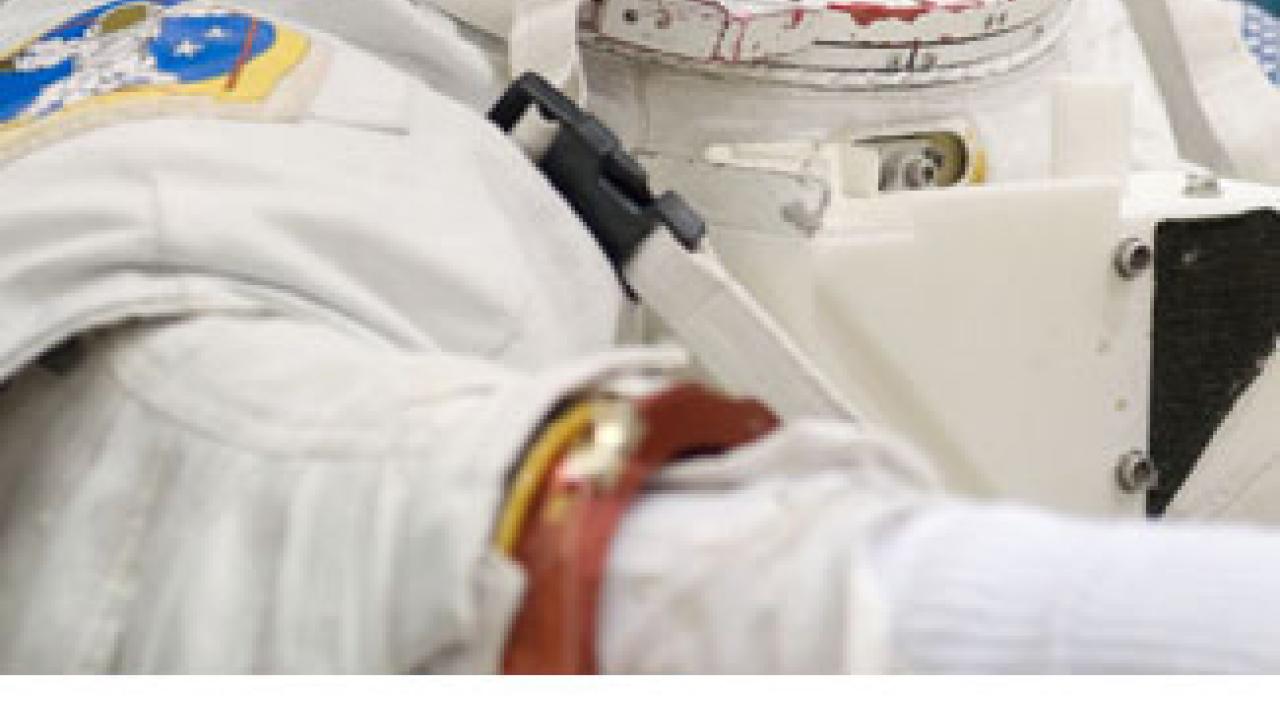What was supposed to be her first two spacewalks will become at least three as UC Davis alumna Tracy Caldwell Dyson and another astronaut go back outside this week to tackle a failed pump motor assembly.
On Saturday, Caldwell Dyson and fellow Expedition 24 flight engineer Doug Wheelock were stymied by a leak as they wrestled with the ammonia line quick disconnect mechanism for the broken cooling system. They are tentatively scheduled to resume the repairs outside the International Space Station on Aug. 11 and 15.
According to NASA, the coolant pump is one of 14 major repairs on the to-do list for the long-term operation of the station.
NASA TV shows mission coverage at 4 p.m., 8 p.m., midnight and 3 a.m.
Caldwell Dyson is in the midst of a six-month mission on the space station (having arrived in April aboard a Russian Soyuz) and she visited the station once before, for almost two weeks in 2007, as a crewmember of the space shuttle Endeavour.
She is making history in a couple of ways: personal history with her first spacewalks, and space station history by adding American Sign Language to the long list of languages that astronauts from around the world have brought to the orbiting outpost.
ASL is said to be the fourth most commonly used language in the United States, according to the National Institute on Deafness and Other Communication Disorders, part of the National Institutes of Health.
In a six-minute video sent from space on July 22, Caldwell Dyson signed about how she learned ASL in high school, from a fellow sprinter on the track team, a deaf girl; and continued her study of ASL in college, as an undergraduate and graduate student.
She did not mention it in the video, but her graduate education took place at UC Davis, where she earned a doctorate in chemistry in 1997. During her time here, she also learned Russian and how to fly.
In her video from space, Caldwell Dyson recalled that as a graduate student she tutored a deaf student. “She needed help understanding chemistry because she had a teacher who wasn’t deaf, and she couldn’t watch the teacher, read and watch the interpreter all at the same time,” Caldwell Dyson said.
“I helped her and she helped me learn new vocabulary words. Like before, I didn’t know how to sign chemistry electrons … words like that.”
In speaking directly to deaf people, Caldwell Dyson said: “One thing I have learned is that deaf people can do anything. The only thing they can’t do is hear. Maybe some day you can fly into space and live on the ISS.”
In a news release, the National Aeronautics and Space Administration added the following comments from Caldwell Dyson: “Ultimately, this isn't really about me learning or knowing ASL. This story should be an avenue for deaf students — from children in kindergarten to college undergraduates to doctoral candidates — to see themselves belonging to this amazing thing called NASA and participating in scientific research and space exploration.”
Replacing a cooling system pump
During the planned spacewalk on Aug. 7, Caldwell Dyson and fellow U.S. flight engineer Doug Wheelock are tasked with removing a large pump and putting on a spare unit — by disconnecting and reconnecting five electrical connectors, four fluid quick-disconnect devices, one fixed grapple bar and four bolts.
Each pump module is 5½ feet long, 4 feet wide and 3 feet tall — and weighs 780 pounds, though the weight means nothing in zero gravity.
The pump failed the night of July 31 after a spike in electrical current tripped a circuit breaker and shut down half of the station’s cooling system.
The crew tried unsuccessfully to restart the pump, which feeds ammonia coolant into the cooling loops to maintain the proper temperature for the station’s electrical systems and avionics.
According to a NASA news release, Wheelock, making his fourth spacewalk, has been designated EV1, or extravehicular crew member 1, and will wear a spacesuit with red stripes, while Caldwell Dyson, designated EV2, will wear an unmarked spacesuit.
Wheelock and Caldwell Dyson’s job: unbolt and remove the failed pump module, and install the spare during one spacewalk. Then, on Aug. 11, Wheelock and Dyson are due to venture outside again, this time to hook up a variety of electrical and fluid connections for the new pump module.
Caldwell Dyson’s mission stretches over two space station expeditions, designated 23 and 24. She is due to return to Earth aboard a Soyuz craft in September.
On the UC Davis home page: The International Space Station, where alumna Tracy Caldwell Dyson is working for six months, is shown orbiting the Earth. (Russ Thebaud/UC Davis photo illustration from a NASA image)
On the Web
International Space Station news (including the latest on the spacewalks)
NASA news release and Caldwell Dyson’s sign language video (with captioning)
More about American Sign Language (from the National Institute on Deafness and Other Communication Disorders)
Media Resources
Dave Jones, Dateline, 530-752-6556, dljones@ucdavis.edu
